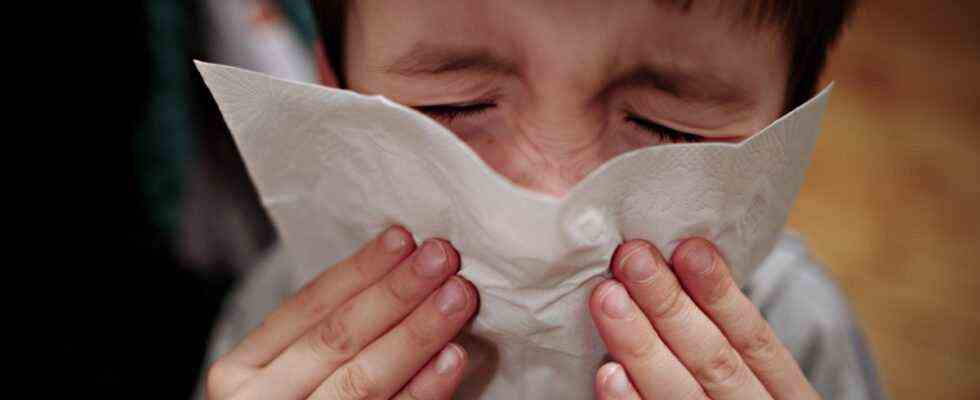In the second autumn without Oktoberfest, many thought Munich would be spared the traditional Wiesn flu wave. But now it shows: coughing, runny nose, sore throat – everything is back. All kinds of pathogens are rampant in daycare centers and kindergartens, and a noticeable number of children are sick. The pediatrician practices are working to the limit, and the clinics are also full. It is an extraordinary situation for which the coronavirus is not directly responsible – but it all has to do with the pandemic.
“I need a PCR test for school: is there anything else besides the Theresienwiese?” Asks a mother in a parent group of a news service. Another tells about her child in the crèche. It has a fever. For the third time since the summer vacation. A father cancels a meeting at the swimming pool. He got infected from his children and is in bed. Finally, one of them tells of a couple who are friends with an infant who have been moved to Garmisch because there is no longer any space in the children’s clinics in Munich.
“Many parents are insecure because their children have not been sick for a long time”
Conversations like this are likely to happen more often. The Robert Koch Institute (RKI) has recorded an increase in respiratory infections throughout Germany since September. That is earlier than in previous years, when many viruses and bacteria only really took root at the turn of the year. Young children in particular are badly affected this fall. According to the RKI, colds, bronchitis, throat and tonsillitis, but also flu cases were diagnosed with them significantly more frequently than in the previous year, when the institute recorded what is probably the weakest influenza season in decades due to the corona protective measures.
The majority of infants and small children are therefore infected with the “respiratory syncytial virus (RSV)”, a respiratory tract infection that affects the bronchi and can cause pneumonia. In the past year, many were spared an infection, as other germs can also be slowed down well by reducing contact, keeping distance, ventilating and wearing a mask. And so the 2020 and 2021 cohorts are now going through their first infections at the same time.
“Many parents are insecure because their children have not been sick for a long time,” says Ludwig Schmid, who works in a group practice in Obersendling. As a rule, the illnesses were harmless, but could last for a few weeks. “Many think children’s immune systems are weak, but the opposite is true,” he says. The child’s immune system needs the infections in order to be trained. “Exercise: That’s what it’s doing right now.” Just a few months earlier than usual, when the practices didn’t fill up until December.
15 to 20 infections per year are normal
“In the zero to four-year-olds, over 20 percent of the age group are currently suffering from respiratory infections, which corresponds to an incidence of over 20,000 for normal respiratory infections,” says the state chairman of the Bavarian Association of Pediatricians (BVKJ) Michael Hubmann. He supports an initiative by the Bavarian Ministry of Family Affairs, which is intended to enable daycare children with colds to visit daycare and kindergarten from home with a negative rapid test result. Up until now, a rapid PCR or PoC antigen test had to be submitted so that a child with mild symptoms of the disease could be cared for.
This is supposed to relieve the pediatricians. “The practices are flooded with inquiries and patients. It’s almost unbearable,” says Gabi Haus, chairwoman of the PaedNetz München, an association of around 100 children’s and adolescent practices in Munich. The pediatrician has a practice at Candidplatz in Untergiesing. In the past few weeks, more often children with banal infections have been presented there, as parents need certificates for kindergarten, daycare, school or employers. “Zettelitis” is what she calls it, which is holding the doctors up unnecessarily. “We have to triage very strongly. That then hits some harder,” she says, so prioritize children according to the degree of the disease and not according to how long they have been waiting.
This leads to resentment, among staff and patients. 15 to 20 infections per year, that’s normal for young children, says Doctor Haus. She advises parents to be patient: “If a cough doesn’t go away after two days and there are no dangerous symptoms such as fever, you don’t need to see a doctor,” she says, adding another demand to politicians: “All of the ballast has to go . ” All rules should be considered in combination and then communicated in good time. The pandemic will accompany everyone for a while. And: “I don’t know any colleague who sits there and has nothing to do.”
This is also reflected in the Munich clinics. According to the intensive care register of the German Interdisciplinary Association for Intensive Care and Emergency Medicine (DIVI), almost all children’s clinics have reported limited capacities or no free intensive care beds at all. The statistics change daily, beds become free, patients are discharged or relocated. Even before Corona, the hospitals were often so full in the winter months that small patients had to be turned away. That is why the bed calls will start in October this year.

